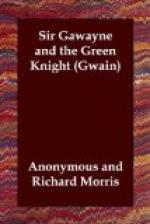[FYTTE the third.]
I.
[A] Ful erly bifore þe day þe
folk vp-rysen,
Gestes þat go wolde, hor grome3 þay calden,
1128 [B] & þay busken vp bilyue, blonkke3 to sadel,
Tyffen he[r] takles, trussen her males,
Richen hem þe rychest, to ryde alle arayde,
Lepen vp ly3tly, lachen her brydeles,
1132 [C] Vche wy3e on his way, þer hym wel lyked.
[D] Þe leue lorde of þe londe wat3 not þe last,
A-rayed for þe rydyng, with renkke3 ful mony;
[E] Ete a sop hastyly, when he hade herde masse,
1136 With bugle to bent felde he buske3 by-lyue;
[F] By þat þat any day-ly3t lemed vpon erþe,
He with his haþeles on hy3e horsses weren.
[G] Þenne þise cacheres þat couþe, cowpled hor
hounde3,
1140 Vnclosed þe kenel dore, & calde hem þer-oute,
[H] Blwe bygly in bugle3 þre bare mote;
Braches bayed þerfore, & breme noyse maked,
[I] & þay chastysed, & charred, on chasyng þat
went;
1144 A hundreth of hunteres, as I haf herde telle,
of þe best;
[J] To trystors vewters 3od,
Couples huntes of kest,
1148 Þer ros for blaste3 gode,
[Fol. 106b.]
[K] Gret rurd in þat forest.
[Sidenote A: Before day-break folks uprise,] [Sidenote B: saddle their horses, and truss their mails.] [Sidenote C: Each goes where it pleases him best.] [Sidenote D: The noble lord of the land arrays himself for riding.] [Sidenote E: He eats a sop hastily and goes to mass.] [Sidenote F: Before day-light he and his men are on their horses.] [Sidenote G: Then the hounds are called out and coupled.] [Sidenote H: Three short notes are blown by the bugles.] [Sidenote I: A hundred hunters join in the chase.] [Sidenote J: To the stations the “fewters” go,] [Sidenote K: and the dogs are cast off.]
II.
[A] At þe fyrst quethe of þe quest
quaked þe wylde;
Der drof in þe dale, doted for drede,
1152 Hi3ed to þe hy3e, bot heterly þay were
[B] Restayed with þe stablye, þat stoutly ascryed;
[C] Þay let þe hertte3 haf þe gate, with þe hy3e
hedes,
Þe breme bukke3 also, with hor brode paume3;
1156 For þe fre lorde hade de-fende in fermysoun
tyme,
Þat þer schulde no mon mene[1] to þe male
dere.
[D] Þe hinde3 were halden in, with hay & war,
Þe does dryuen with gret dyn to þe depe slade3;
1160 Þer my3t mon se, as þay slypte, slentyng
of arwes,
[E] At vche [þat] wende vnder wande wapped a
flone,
Þat bigly bote on þe broun, with ful brode
hede3,
[F] What! þay brayen, & bleden, bi bonkke3 þay
de3en.
1164 & ay rachches in a res radly hem fol3es,
Huntere3 wyth hy3e horne hasted hem after,
[G] Wyth such a crakkande kry, as klyffes haden
brusten;
What wylde so at-waped wy3es þat schotten,
1168 Wat3 al to-raced & rent, at þe resayt.
Bi þay were tened at þe hy3e, & taysed to
þe wattre3,
Þe lede3 were so lerned at þe lo3e trysteres,




